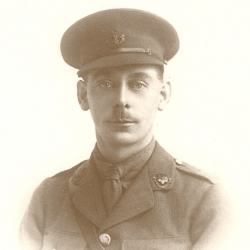William Hampson Lillie was born in Wimbledon, Surrey on October 9, 1888. His father, William, owned a Cotton Cloth Finishing business. By 1901 the family had moved to Marple.
William Hampson Lillie attended boarding school at Adlington Hall, in Cheshire. At the turn of the century Adlington Hall was briefly a “School for Backward and Delicate Boys” and in 1901 it was run by schoolmaster Reverend Oswald E. Hayden, a vicar’s son, and a fresh Oxford Christ Church graduate. Only five pupils are listed as boarders in the 1901 census. After that he attended Manchester Grammar School.
Lillie was commissioned as 2/Lt. in the 9th Battalion Manchester Regiment on September 3, 1909 and promoted to full Lieutenant on January 1, 1910. But on November 15, 1913 he resigned his commission. In his civilian life he was back living with his parents in Marple and working as an assistant cloth finisher in the family business.
He was re-commissioned into the 1/9th Battalion Manchester Regiment on September 2, 1914 while the Battalion was at camp at Bury preparing for war service.
He sailed with the Battalion to Egypt in September 1914 and served with them there throughout their training and preparation for action. He was promoted to Lieutenant, along with several other junior officers, on November 4, 1914 while serving in Egypt. While in Egypt he was temporarily assigned as Military Liaison Officer (MLO) to the Indian Expeditionary Force, Suez and the Australian & New Zealand Expeditionary Force, Alexandria. He landed with the 1/9th in Gallipoli on May 9, 1915 as a platoon commander in C Company.
He survived the intense fighting that C Company in particular was involved in, in June, and was subsequently transferred to Brigade Staff where he served as Staff Captain. He was evacuated to hospital in Alexandria on August 9th and is noted in the Brigade war diary as returning from detail camp at Mudros in November 1915. In fact, he rejoined the Battalion on November 17th and was promoted to temporary Captain upon his return.
On February 8, 1916, while the Battalion were in Egypt, he was granted 56 days leave in the UK. He rejoined them on April 4, 1916.
He landed with the 1/9th in France on March 11, 1917 and was appointed temporary Captain during a Company reorganization that same month relinquishing the temporary rank in August 1917. On May 12, 1917 he was granted 16 days leave in the UK rejoining the Battalion on May 28th. On June 11, 1917 he was attached to the 126th Brigade HQ and remained there for 69 days where he served as Staff Captain and Assistant Brigade Major. During this period he was promoted to Captain with precedence from July 5, 1917. He was wounded in action (Gassed) on September 6th at Ypres and spent 37 days in hospital before rejoining the Battalion on October 13, 1917. 10 days later he attended a 4th Army Gas School and upon completion was sent to the UK and struck off the strength of the Battalion on November 1, 1917.
On November 6, 1917, he was seconded to the British Military Mission to the USA and subsequently traveled to California where he was stationed at Camp Kearny. Camp Kearny was a training camp for the National Guard regiments and inducted men who would comprise the 40th “Sunshine” Division. The 40th occupied the camp from August 1917 – July 1918 before being sent overseas, to France, on August 3, 1918 where they were re-designated as the 6th Depot Division. In this capacity they received, equipped, trained, and forwarded replacements to other Divisions. Captain Lillie served as their Anti-Gas Instructor. He was demobilised in 1919.
After the war, orders to reform the 9th Battalion were received in October 1920 and Lt-Col D. H. Wade was appointed Commanding Officer. On February 24, 1921 William Hampson Lillie was appointed Captain in the Territorial Force Reserve and joined the newly reformed battalion.
In civilian life he married Mary Ida Ruston Fitter in Warwickshire, on March 27, 1920. Their son Kenneth Charles Lillie was born in February the following year and a daughter, Ida Sonia Lillie, was born in November 1922. At this time they were living in Hazel Grove, Stockport and William had taken over the family business.
He continued to serve with the battalion until his 50th birthday on October 9, 1938 when he was obligated to retire due to reaching the age limit, retaining the rank of Captain. After the outbreak of war, he submitted his application for Application For Registration in the Army Officers’ Emergency Reserve, for Appointment to a Temporary Commission in His Majesty’s Land Forces on Mobilization and rejoined the Army as Lieutenant on April 8, 1941. He went on to serve for 2 1/2 years before relinquishing his commission on December 23, 1943 just after he turned 55. His son served as an officer in the Royal Army Service Corps, reaching the rank of Temporary Captain and was awarded the Oder of the Bath in 1945, while his daughter in the Women’s Land Army, in Anglesey.
Captain William Hampson Lillie died in 1972. He was 83 years old.

